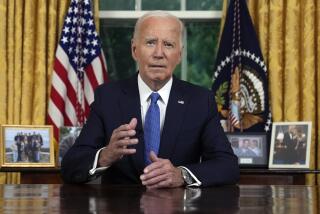John Boehner, the embattled old-school speaker, gives up the fight

House Speaker John A. Boehner of Ohio tearfully announces that he is stepping down from his post and retiring from the House at the end of October.
Reporting from Washington — As House Speaker John A. Boehner stood alone with Pope Francis, moments before the two men stepped onto the Capitol balcony overlooking the National Mall, the pontiff put his arm around the speaker, pulled him close and asked for his prayers.
The request stunned the former altar boy, who had written letters to each pope for 20 years inviting them to speak to Congress. Francis was the first to accept. Boehner gratefully fulfilled the request to pray for him.
That evening, he went home and told his wife he might have an announcement to make the next day. In the morning, after saying his daily prayers, he decided the time had come to resign.
Boehner’s announcement on Friday caught Washington by surprise. For weeks, Capitol Hill had buzzed with rumors of conservative plots to overthrow the long-embattled speaker. Instead, he would leave on his own terms, stepping down on Oct. 30 and giving up the congressional seat from southern Ohio that he has held since
1991.
He revealed the decision to House Republicans behind closed doors in a morning meeting, choking up as he so often does, then closed the session by reciting the prayer of St. Francis: “Lord, make me
an instrument of your peace.”
“This morning I woke up, I said my prayers, as I always do, and I decided: Today’s the day I’m going to do this. As simple as that,” he told reporters at a news conference later in the day.
He brushed aside the suggestion that the “awesome sight of the pope” speaking to Congress had provided a career-capping opportunity to quit a job he had clearly stopped enjoying. Instead, he said, it was better to step aside than to allow Congress to continue to be torn apart by efforts to oust him.
“This turmoil that’s been churning now for a couple of months — it’s not good for the members, not good for the institution,” Boehner said. “There wasn’t any doubt about whether I could survive the vote. I don’t want my members to go through this. I certainly don’t want the institution to go through this.”
Boehner rose to the speaker’s job in January 2011 after Republicans recaptured control of the House. Although he was elected by the new majority, he never quite clicked with it. As he struggled with the tea party conservatives who had swept Republicans to power, Congress careened from crisis to crisis.
Another episode is looming — a possible shutdown of federal agencies next week, prompted by conservative efforts to end all federal support for Planned Parenthood. Once again, Boehner faced the unpalatable choice of allowing an outcome that he felt would damage his party’s standing with voters or passing a bill with the
help of the Democratic minority.
Time and again over the last four years, Boehner had been in that weakened role — unable to corral enough votes to pass bills, forced to seek help from his predecessor, Minority Leader Nancy Pelosi of San Francisco. Each instance only lowered his standing among his troops.
“John is from a different generation of Congress, not just a different generation of Republicans,” said Rep. Mick Mulvaney (R-S.C.), who was elected in 2010 and is leading the fight against Planned Parenthood.
“That’s one of the fundamental differences that we had with him and that our rank and file had with him: They didn’t understand why we didn’t fight. And John’s attitude was, ‘Well, this is fighting,’” Mulvaney said. “And he’s right — in a 1994 kind of way.”
Those who have tried repeatedly to oust Boehner, however, may be trading one hobbled speaker for another.
Next in line for the job — and almost certain to win it — is House Majority Leader Kevin McCarthy of Bakersfield, an affable figure with ties to many younger conservatives whom he helped elect in 2010. He will face
the same internal Republican divisions that plagued Boehner, however.
Like Boehner, or any speaker in the current era, McCarthy would lack many of the tools that allowed Pelosi and previous speakers to strong-arm members when they needed votes.
The abolition of earmarks — funding that is set aside for projects in lawmakers’ home states — has deprived leaders of rewards to dole out. In any event, the newer conservatives shun such deals. At the same time, the growth of outside groups ready to wage ideologically motivated primary challenges has eroded the power any speaker can wield.
Conservatives wondered aloud Friday how much really would change with President Obama still holding veto power from the White House and Democrats still across the aisle. They do not have enough votes to elevate one of their own to the speaker’s chair, they acknowledge.
“We’re not going to get our agenda done that comes out of the House,” said Rep. Bill Flores (R-Texas), chairman of the Republican Study Committee, a conservative caucus. “And you’re going to have a new speaker who’s going to have to wonder if he or she is going to be the next person to lose their head.”
Boehner told reporters Friday that he had never expected to stay in office this long and had been thinking of retiring at the end of last year.
“I’m a regular guy with a big job. And I never thought I’d be in Congress, much less I’d ever be speaker,” said the man who often reminds reporters that his father owned a bar.
But, he said, when then-Rep. Eric Cantor (R-Va.), majority leader at the time, lost his primary election in June 2014, Boehner decided he needed to stay on the job to provide consistency. His plan, privately kept, was to leave on his birthday this fall, he said.
“I would not describe it as having had enough,” Boehner said Friday. “I feel good about what I’ve done. Every day, I’ve tried to do the right thing for the right reasons. And tried to do the right thing for the country.”
Former President George W. Bush called Boehner after hearing the news, as did Obama, who publicly praised him as a “patriot” and a “good man.”
“Most importantly, he’s somebody who understands that in government — in governance — you don’t get 100% of what you want, but you have to work with people who you disagree with, sometimes strongly, in order to do the people’s business,” Obama said at a news conference in the White House Rose Garden with Chinese President Xi Jinping. “There’s no weakness in that.”
Even as maneuvering to reorder the leadership ranks gets underway, with several Republicans angling to rise up the ladder, Boehner will face a few last decisions about how much compromising to do.
During the private meeting of Republican lawmakers at which Boehner made his announcement, one senior member suggested that the speaker use the opportunity to “clear the barn” on his way out the door.
That prompted concern among some — hopes among others — that, freed of the fear of retaliation, Boehner could muscle through a few last deals. In addition to the fight over federal spending, Congress has several other pending deadlines, including decisions on whether to renew authorization of the Export-Import Bank and raise the debt ceiling.
“There’s a lot of work that needs to be done,” Boehner said. “And I plan on getting as much of it done as I can before I exit.”
Times staff writers Michael A. Memoli and Christi Parsons contributed to this report.
More to Read
Sign up for Essential California
The most important California stories and recommendations in your inbox every morning.
You may occasionally receive promotional content from the Los Angeles Times.











